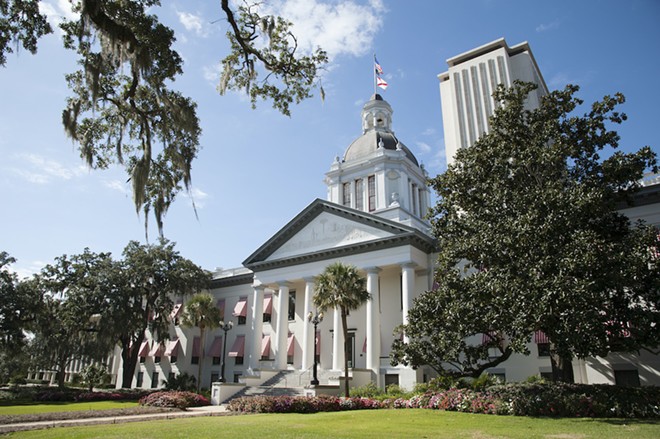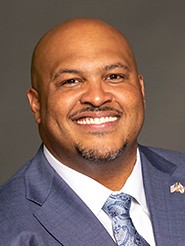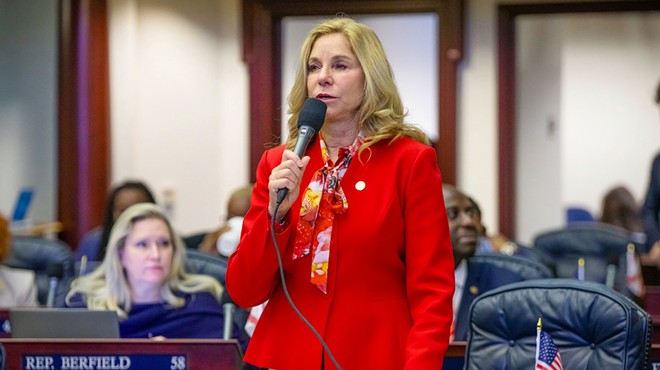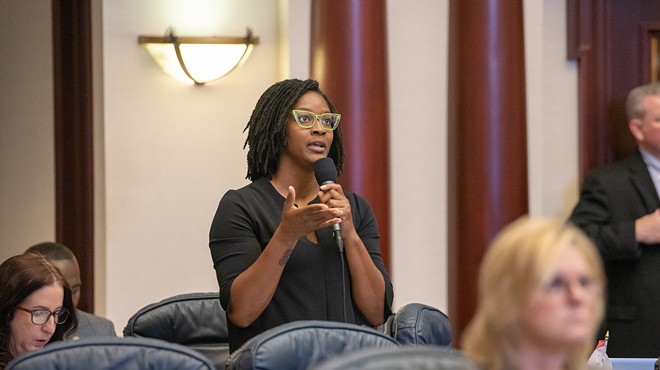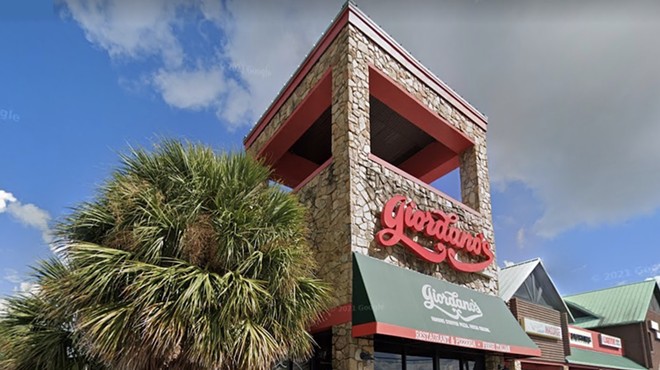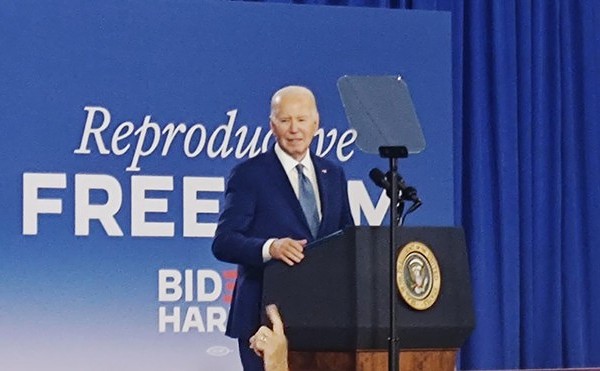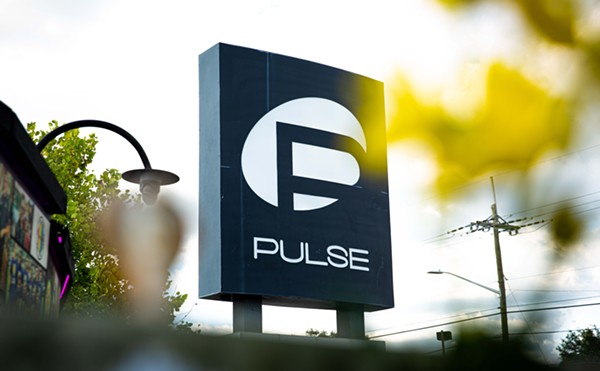A new bill, filed by Republican Sen. Corey Simon of Tallahassee for consideration during the 2024 legislative session, would lower age requirements for working in roofing and scaffolding — jobs currently deemed too hazardous for children under existing state law.
Email communications obtained by Orlando Weekly through a public records request show the bill’s founding advocates are two powerful industry lobbying groups: the Associated Builders and Contractors (ABC) of Florida — a top anti-union lobby — and the Florida Home Builders Association, both of which write generous checks to Republican politicians’ campaign funds (and yes, occasionally some Democrats’, too).
Carol Bowen, chief lobbyist for the Associated Builders and Contractors, emailed draft "Workforce Education" legislation to an aide for Sen. Simon in late October, copying another ABC lobbyist and a lobbyist for the Florida Home Builders Association.“The three of us are the point people for this bill and are at your disposal and Senator Simon's,” Bowen wrote, with a draft of the bill attached. Simon, a first-term state senator and former professional football player for the NFL and Florida State University, filed the legislation three weeks later.
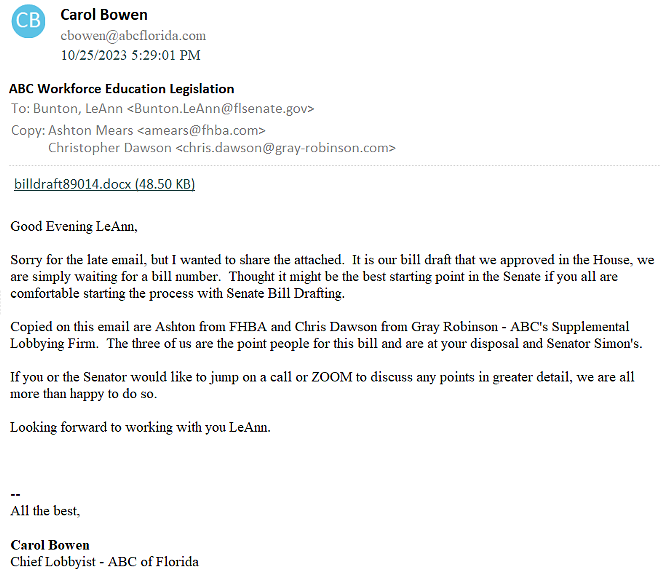
The amendment makes up just a small section of the 18-page proposal — reminiscent of a ban on rent control that was tucked into a 95-page housing bill this spring that was similarly backed by industry groups.
Under state law currently, Florida minors under 18 are forbidden from working in roofing or scaffolding above six feet, with limited exceptions. The Florida Department of Business and Professional Regulations says those jobs are “dangerous to the health and safety of minors.”
But Florida’s influential trade groups aren’t working on this in isolation. The Home Builders Association of Iowa, for instance, was a major industry supporter of a bill signed into law by Iowa Gov. Kim Reynolds — a backer of Florida Gov. Ron DeSantis' presidential campaign — that similarly lifts restrictions on hazardous work performed by teens.
Representatives of the U.S. Department of Labor later confirmed in a letter to Iowa Democratic lawmakers that provisions of the new Iowa law “appear to be inconsistent” with the federal Fair Labor Standards Act, which covers child labor protections.
“FLSA-covered employers that violate federal child labor law are subject to various penalties, including civil money penalties, which depend on the nature of the violations and the underlying factual circumstances,” the letter reads.
According to the Economic Policy Institute, Florida is one of at least 16 states where state lawmakers have moved to weaken child labor protections, even amid reports of rising labor violations.
The number of minors working in violation of child labor law has spiked 88% since 2019, according to the federal labor department, which enforces federal child labor standards. Employers in Florida — including a chain of skating rinks, a trampoline park, a Tampa-area Tropical Smoothie Cafe and a roofing contractor — have collectively been fined over $100,000 by the department over child labor violations so far this year alone.Sen. Simon’s office declined to comment on his filing of Senate Bill 460 when reached by Orlando Weekly, but child and labor advocates have sounded the alarm.
“It is commendable that the state is prioritizing increasing skilled trades in the Sunshine State, but it should not come at the expense of children’s health and safety,” said Florida Policy Institute CEO Sadaf Knight in a statement.“In an industry like construction where tight deadlines and safety risks abound, Florida must not expose teens to added dangers — especially when there is no guarantee that a supervisor will be able to ensure that child’s well-being when they are up on a ladder or roof on the job site.”
Under Senate Bill 460, older teens would need to obtain a federal OSHA 10 safety certificate before working in roofing or scaffolding, and they’d be required to work under the supervision of someone who’s at least 21 years of age with experience in the industry.
According to the most recent federal data, however, there is only one direct supervisor in Florida available for every seven construction and extraction workers.
Further, construction is one of the most common industries in which child labor violations occur already, in addition to the low-wage and largely non-union restaurant, retail, and amusement industries.
Sunscape, an Orlando-based landscaping material supplier, illegally allowed two 17-year-olds and a 13-year-old to operate a forklift, federal investigators found in 2021.
The contractor, JGN Services, also allowed the 15-year-old to work more than three hours on school days and more than 18 hours during school weeks. The injured teen was one of 688 minors federal investigators found employed in hazardous jobs in the U.S. from Oct. 1, 2021, to Sept. 30, 2022 according to the WHD.
But backers argue Senate Bill 460 will increase opportunities for kids, and dismiss safety concerns. Rusty Payton, a lobbyist for the Florida Home Builders Association — a group representing thousands of trade contractors and construction, engineering and home building companies statewide — confirmed the group’s support for the bill in a statement emailed to Orlando Weekly. He did not address their involvement in writing it.
“Florida students that are not sure about their career path deserve the opportunity to explore the construction industry and trades in a meaningful way,” said Payton.Current law, he explained, only allows for 16- and 17-year-olds to participate in “hands-on training” on job sites in the trades if they’re enrolled in a Career & Technical Education program.
“SB460 will help students identify tangible career goals that will remove barriers to economic self-sufficiency and will be especially helpful for students enrolled in a school district where CTE programs are not readily available,” he said.Republican mega-donors championing child labor rollbacks
Proposals in state legislatures aimed at deregulating child labor have been backed by several influential industry groups.For example, local chambers of commerce and the National Restaurant Association, a trade group that represents the interests of low-wage industry giants like Burger King and McDonald’s (a repeat violator of child labor law), as well as companies like the Walt Disney Co. and Darden Restaurants, which owns chains including Olive Garden, Ruth's Chris Steak House, Bahama Breeze and many more.
The Florida Restaurant & Lodging Association, a state affiliate of the so-called "Other NRA," told Orlando Weekly through a spokesperson their members haven’t “fully reviewed” Senate Bill 460, which only loosens age requirements for certain hazardous jobs in the trades, not in restaurants or hotels. So they don't have a position on it just yet.
But the group has backed another bill filed for consideration in 2024 that would similarly roll back child labor protections by allowing minors to work longer hours. It would also restrict cities and counties from enacting stronger child labor protections on a local level.
But current “restrictions” on child labor, she said, “limit their meaningful involvement, with many businesses reluctant to hire and mentor them due to stringent requirements.”
“Florida’s hospitality industry offers abundant career training and employment prospects, and there is also a need for additional labor,” Chambers added.The bill they support, filed by Republican Florida House Rep. Linda Chaney, was penned by the Foundation for Government Accountability, a conservative think tank based in Florida that has been the driving force behind efforts to relax child labor regulations in a number of states, including Iowa, Arkansas, Missouri and Minnesota, through its lobbying arm, the Opportunity Solutions Project.
“Apparently some people don't like HB 49, so the data points and talking points would be helpful sooner rather than later,” the aide texted, one day after the bill was filed. The lobbyist, sympathetic, delivered, according to email records.
Nina Mast, a state economic analyst with the Economic Policy Institute, wasn’t surprised to learn the FGA — a group that's lobbied for a number of policies that'd weaken the social safety net — was behind that bill.
“What we’re seeing is really a coordinated, multi-state effort led by business lobbying groups and right-wing advocacy groups to weaken state laws that govern current labor protections,” she told Orlando Weekly.
So it’s not just the FGA — whose largest funder is billionaire and DeSantis donor Richard Uihlein — but a “constellation” of groups that are invested.
A lot of these major industry groups — including the FRLA, the ABC of Florida and the Florida Home Builders Association — also have a history of lobbying against other policies that raise labor standards, like minimum wage increases, and throwing thousands of dollars at politicians’ campaign funds to sweeten (or seal) the deal.
All three joined a failed campaign against Florida’s $15 minimum wage ballot measure in 2020 — which passed with nearly 61% support, and earned more Floridans' votes than either President Biden or former president Trump.Industries pushing for child labor rollbacks, Mast said, are also commonly the ones already violating existing labor protections.
“I think it’s important to acknowledge that this is an exemption or a provision being sought by employers that are already known to be low-road, non-union — employers that routinely violate the law, whether that's for young people or adults,” said Mast.
“These are employers that are already illegally misclassifying workers [and] violating other labor standards like overtime protections.”
Not kids’ work
Not all child labor rollbacks introduced or passed by state legislatures specifically aim to allow minors to be employed in hazardous jobs.Some aim to lower age requirements for working in the presence of alcohol — because parents really want their children around intoxicated adults — or to allow youth to work overnight shifts on school nights, even though experts generally agree working over 20 hours per week can negatively affect schooling, causing students to fall behind or skip school, and can increase the risk for behavioral issues, like drug use.
Backers of these proposals, like the FGA, argue that deregulation policies offer youth workers more “flexibility” and the “freedom” to work longer hours or in more dangerous industries.
But child and labor advocates warn policies that undermine child labor protections — which are already regularly ignored by some employers — increases the risk for exploitation. And it’s children who come from socially or economically marginalized families who are most vulnerable.An investigation by the New York Times found that migrant children as young as 12 and 13 have for years been put to work in brutal jobs across the United States, including Florida.
Children from poor families — struggling to put food on the table or pay rent — are more likely to take on extra work to support themselves and their families when times are tough, and may be desperate enough to put up with working conditions that are subpar.
Historically, class divides were also seen in youth participation in the workforce prior to the establishment of federal child labor law in 1938, which was followed by state laws — some of which offer stronger protections than the federal minimums.
Children from poorer families were less likely to have access to education or to have the time for education, because they had to earn a wage.
Mast and other critics of child labor rollbacks worry these modern-day proposals popping up “sort of threaten to take us back to that era of inequity, in terms of who has access to economic opportunity in our economy.”
Considering Republican lawmakers have also sought to roll back access to abortion care and equal rights for LGBTQ communities at the urging of right-wing advocacy groups, this isn't exactly an implausible conclusion.
Federal child labor standards should be seen as the minimum floor, Mast said. Florida's standards, like those of some other states, actually exceed federal FLSA standards as they exist currently. Florida's minimum wage of $12 an hour similarly exceeds the federal wage floor.
Undermining state standards by lowering them down to federal standards or below is problematic, Mast argued. The FLSA “shouldn't be the gold standard that we're seeking to emulate,” she explained. “It should be the the absolute minimum that states should be working to exceed.”
There are also health and safety risks to proposals like Simon's. Children are more susceptible to injuries and death on the job, and may be less likely to speak up if their boss isn’t paying them what they’re owed, or works them overtime without extra pay.
This kind of behavior — wage theft — is common in the construction industry.
And while some states have strong labor agencies to help enforce labor laws, Florida doesn’t.
Florida lawmakers dissolved the state’s department of labor over 20 years ago under then-President Jeb Bush. Child labor complaints today can be reported to the Florida Department of Business and Professional Regulation, which didn't respond to our request for comment regarding their involvement in actual enforcement.
Generally, the federal Department of Labor is left to pick up the slack. But while the Biden administration announced plans in February to beef up enforcement of child labor law, the federal department also suffers its own challenges. Namely, flat-funding.
This can also cause federal investigators to be selective in the cases they take on.
To help address rising violations, state lawmakers in some other states have moved to strengthen child labor protections in recent years. According to the Economic Policy Institute, seven states have introduced bills to safeguard or increase protections for young workers, and four states have enacted them.Meanwhile, it's looking like the Florida’s GOP-dominated Legislature could be hearing at least two proposals early next year that would undermine them.
The ABC of Florida, a primary backer behind Simon's bill, did not respond to Orlando Weekly’s requests for comment on their involvement in writing SB 460.
But it’s also not clear that’s the group’s only priority.
The prominent trades group, which has in the past tried to undermine minimum wage increases on a local level, has also registered chief lobbyist Carol Bowen to track a GOP-sponsored bill (HB 433) that would prevent local governments from establishing stronger workplace heat exposure requirements.
That bill was filed less than a week after leaders in Miami-Dade County, facing industry pressure from groups like the ABC, delayed a vote on a local law that sought to establish stronger heat protections for outdoor construction and agricultural workers by preempting regulation to the state.The Florida Home Builders Association has similarly supported preemption policies, which tie the hands of local governments, giving Panhandle Tallahassee ultimate authority over regulations in the rest of Florida's towns and cities.
The Florida Home Builders supported the new law banning rent control statewide, and also supported a bill approved by lawmakers this spring (SB 170) that allows business owners to sue cities and counties over ordinances they allege are “arbitrary or unreasonable.”It’s unclear at this time where the billionaire-funded Foundation for Government Accountability — a driving force behind proposed child labor rollbacks — stands on the ABC/FHBA-backed bill.
Emails obtained by Orlando Weekly show that a lobbyist for FGA’s Opportunity Solutions Project requested a meeting with Sen. Simon’s aide to “discuss” SB 460 one day after its filing. We have no records of the lobbyist reaching out to Simon prior to.The aide emailed back later that day to share that Anita Berry — the lobbyist who gave Rep. Chaney her child labor bill and talking points — had stopped by to discuss Chaney’s bill, HB 49.
The email implies, but does not explicitly confirm, that the FGA is looking for Simon to file a companion bill to Chaney's in the Senate. “We will look it over and see what the Senator would like to do and try to get an answer for you all soon,” the aide wrote.Sen. Simons, who was first elected to his seat in 2022 with 53% of the vote, was one of just a handful of Republicans who voted down a bill backed by the FGA earlier this year that took aim at labor unions. It passed, regardless.
So far, no companion bill to Chaney’s HB 49 has been filed in the Florida Senate. Neither has a House equivalent for SB 460, although Bowen — the ABC lobbyist — shared in an email to Simon’s staff that they’d already gotten their draft “approved” in the House.
Unlike state Senators, who can file as many bills as they want, members of the Florida House can only file seven each — so they have to be selective.
“[W]e are simply waiting for a bill number,” Bowen wrote of the House version, in an email dated Oct. 25.
Florida's 2024 legislative session begins Jan. 9.
Follow us: Apple News | Google News | NewsBreak | Reddit | Instagram | Facebook | Twitter | or sign up for our RSS Feed

